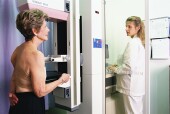
WEDNESDAY, April 11 (HealthDay News) — Treatment-related complications are common in breast cancer patients long after their therapy has been completed, a new study says.
Researchers looked at 287 Australian breast cancer patients and found that more than 60 percent of them had at least one treatment-related complication up to six years after their diagnosis, and 30 percent had at least two complications.
Complications included skin reactions to radiation therapy, weight gain, fatigue, surgery-related issues, upper body symptoms and physical limitations, and lymphedema — a painful limb-swelling condition.
“Our work provides the first accounting of the true magnitude of the post-treatment problems suffered by breast cancer patients, and serves as a call to action for proper monitoring and rehabilitation services to care for them,” study leader Kathryn Schmitz, associate professor of biostatistics and epidemiology at the University of Pennsylvania, said in a university news release.
“We can no longer pretend that the side effects of breast cancer treatment end after patients finish active treatment. The scope of these complications is shocking and upsetting, but a ready solution for many of them already exists in rehabilitative exercise,” said Schmitz, who is a member of the university’s Abramson Cancer Center and serves as a senior scientist on a committee overseeing creation of a surveillance model for breast cancer survivors.
The study was published online April 6 in a special issue of the journal Cancer that focuses on the physical late effects of breast cancer treatment and ways to prevent, monitor and treat these conditions.
There are 2.6 million breast cancer survivors in the United States, the authors noted in the news release.
Many factors can prevent proper monitoring of breast cancer survivors for the types of complications identified in the study, Schmitz and her colleagues said.
Patients may have fragmented care and receive different types of treatment at different hospitals; both patients and doctors may believe that certain complications are “expected” and “normal” and don’t warrant treatment; and many breast cancer patients aren’t aware of or referred to physical therapy professionals.
More information
The U.S. National Cancer Institute has more about breast cancer treatment and side effects.

